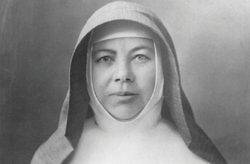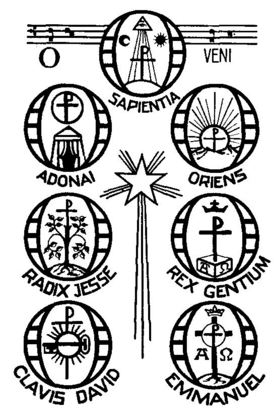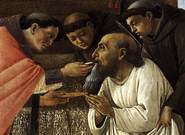 The way of peace leads to the altar and into the
The way of peace leads to the altar and into the
mystery of the Eucharist, the actualization of the Kingdom here and now. From
the altar, the light of the Resurrection penetrates into all that, in our
lives, remains shadowy and locked. With the Virgin of the Annunciation, we have
only to believe in Love and, believing, say faith’s simple “Yes.” Our “little
strength” is of no consequence. Let us go in to the Eucharist to be
overshadowed by the power of Love. Love will do the rest for “God is love” (1
Jn 4:16 ) and ” no word shall be impossible with God” (Lk 1:37). (MDMK)
2 beating hearts, hidden but present in Mystery
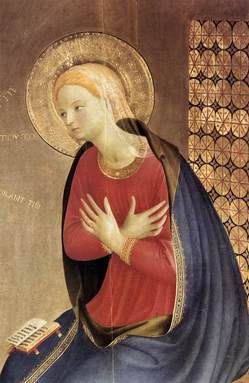 We have all had the occasion by a moment to sense more
We have all had the occasion by a moment to sense more
intensely the presence of Christ in the Eucharist during the celebration of the
Mass, during Eucharistic adoration, or even in the Tabernacle, when we walk
into a church. There is Christ. He is there whether we sense or experience His
presence. But precisely because this is the case, we are sometimes given
to experience that He is present. Such experience is not the source of faith,
but in some way it is its consequence.
Blessed Virgin Mary during Advent? It is reasonable, like the Fathers of the
Church, to see Mary as the original tabernacle. The Word became flesh and
dwells among us. This being hidden but present among us is first of all
realized during the time of Advent in the home of Nazareth, in the womb of
Mary, under the protection of Saint Joseph. Mary meditated upon all these
things and kept them in her heart. We can reasonably speculate that she read
scripture during this time, in silence, most likely the words of Isaiah, his
prophesies, and found in them a sense of the meaning of what was happening to
her.
conceived the Word in her flesh. So that her maternity was accompanied by an
intensification and growth in faith, in contemplation, in the intelligent
perception of mystery. The Second Vatican Council says that during the time of
her pregnancy the heart of the Incarnate Word beat gently below the heart of
Mary, her immaculate heart. Two immaculate hearts, beating silently and
prayerfully in the night of this world.
Christmas Novena, Fifth Oration
Dominican & Franciscan vocation videos
I stumbled upon these vocation videos of the Polish Dominicans and Franciscans. If you don’t understand Polish, don’t fret, neither do I. And since there’s no talking, just music, just sit back and enjoy the brief videos. THE fun thing is just watching the Dominican Franciscan friars. You get a great sense of the spirit of the friars of both groups just by watching the life.
Christmas Novena, Fourth Oration
O Wine of Virgins and Lily of Purity, Who by a touch
of Your hand heals the body and cleanses the soul; Who by dwelling in the womb
of Your Mother has made her the purest of the pure and most admirable among
virgins; We beseech You, through Your Pure Nativity and through the intercession
of Your Mother and Saint Joseph, Your Chosen One, to grant us to be pure in
soul and body and clean in act clean and thought, that we may serve You with a
clean heart and pure body all the days of our lives. Amen.
Pope says John Paul lived a life of heroic virtue & makes others saints
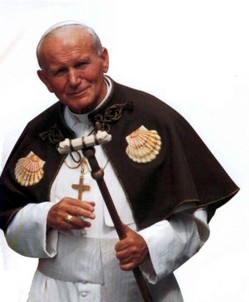 Pope Benedict recognized John Paul II as living a life of heroic virtue upon the recommendation of the Congregation for Saints. There are various steps the Church takes when she investigates someone for possible canonization. This is the second of four of the steps, next being “beatification.” The Church will now refer to John Paul as the “Venerable Servant of God …” but there is no public ceremonial for bestowing this title as there is when a person is beatified or canonized.
Pope Benedict recognized John Paul II as living a life of heroic virtue upon the recommendation of the Congregation for Saints. There are various steps the Church takes when she investigates someone for possible canonization. This is the second of four of the steps, next being “beatification.” The Church will now refer to John Paul as the “Venerable Servant of God …” but there is no public ceremonial for bestowing this title as there is when a person is beatified or canonized.
Archbishop of Canterbury to deliver annual Schmemann Lecture at St. Vladimir’s Seminary
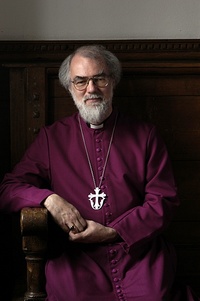 The Most Reverend Rowan Williams, Archbishop of Canterbury will be lecturing in Yonkers, NY, on Saturday, 30 January 2010, 12:30 p.m.
The Most Reverend Rowan Williams, Archbishop of Canterbury will be lecturing in Yonkers, NY, on Saturday, 30 January 2010, 12:30 p.m.
Calling: The Image of Humanity in the Philokalia.”
Christmas Novena, Third Oration
O Admirable Leader Who gains the obedience of Your
people not by the severity of Your judgment but by the sweetness of Your love
and Your welcome sojourn among us. We beseech You, through Your Pure Nativity
and through the intercession of Your Mother and Saint Joseph, Your Chosen One,
to teach us complete obedience to Your holy commandments and to submit to our
superiors, not for fear of punishment but by a willing surrender of mind and
heart, with gladness of heart and spirit. Amen.
Christmas Novena, Second Oration
O Hope of the Patriarchs and longing of the Gentiles,
in Your Nativity You have granted us hope. The joy of this hope has called
together the Shepherds, the Magi and all believers in Your Holy Name, and led
them to adore You with all the acclaim of their hearts. We beseech You, through
Your Pure Nativity and through the intercession of Your Virgin Mother and Saint
Joseph, Your Chosen One, to keep us, by Your grace, from attachment to earthly
goods. Teach us not to depend only on ourselves and the weak ones of this
world, but to rely only on Your Fatherly direction and Your Divine Providence.
Attract our hearts and minds to reflect on Your heavenly riches and to aspire and
long for them above. Amen.
The Greater Antiphons (aka ‘O Antiphons’) of Advent
Advent slightly shifts its focus beginning tomorrow (December 17) when the antiphons for Vespers known
as the Greater Antiphons, but more commonly known as the O Antiphons, are sung.
These biblical texts are sung as the verse introducing the
Magnificat song at Vespers. Most people know these Great Antiphons as the hymn
called “O Come, O Come Emmanuel” (Veni, Veni, Emmánuël). Each verse of the hymn is a reworded
version of the O Antiphons, with the last being the first verse. Rather unfortunately too many priests and church musicians/choir leaders have little understanding of why one would hold off from signing “O Come, O Come Emmanuel” at Mass until this time of Advent, and even then, why one would spread the verses out over the days ahead. (I wonder if we can get our act together to respect the Liturgy and its history to allow the flourishing of the theology to dig more deeply into our hearts and minds.)
Each O Antiphon
addresses Jesus with a title which comes from the prophecies of Isaiah that
anticipate the coming of the Messiah. The first letters of the titles in the
original Latin in reverse order spell “Ero Cras,” meaning “Tomorrow, I will
come.”
December 17 – O Sapiéntia: O Wisdom Who camest out of the mouth of the
Most High, reaching from end to end and ordering all things mightily and
sweetly: come and teach us the way of prudence.
December 18 – O Adonái: O
Adonai, and Leader of the house of Israel, Who didst appear to Moses in the
flame of the burning bush, and didst give unto him the law on Sinai: come and
with an outstretched arm redeem us.
December 19 – O Radix Jesse: O Root of
Jesse, Who standest for an ensign of the people, before Whom kings shall keep
silence, and unto Whom the Gentiles shall make their supplication: come to
deliver us, and tarry not.
December 20 – O Clavis David: O Key of David, and
Sceptre of the house of Israel, Who openest and no man shutteth, Who shuttest
and no man openeth: come and bring forth from his prison-house, the captive
that sitteth in darkness and in the shadow of death.
December 21 – O Óriens: O
Dawn of the East, Brightness of the light eternal, and Sun of justice: come and
enlighten them that sit in darkness and in the shadow of death.
December 22 – O
Rex Gentium: O King of the Gentiles and the Desired of them, Thou Corner-stone
that makest both one: come and deliver man, whom Thou didst form out of the
dust of the earth.
December 23 – O Emmánuël: O Emmanuel, our King and Lawgiver,
the Expected of the nations and their Savior: come to save us, O Lord our God.
